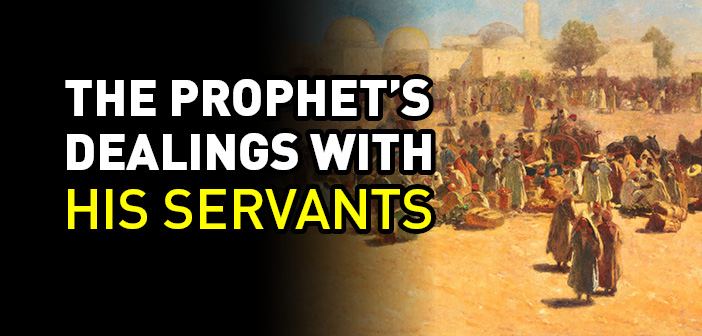How was the relationship of the prophet muhammad with his servants?
“Someone’s spending upon his family, his children, and his maids are all charity.” (Ibn Majah, Tijarah, 1)
Allah’s Messenger (pbuh) saw the people in his service like everybody else as the servants of Allah and treated them nicely. For him, there was no difference between a master and a servant in respect to being humans. He first corrected inappropriate references to servants. (Bukhari, Itq, 17) He stated in one of his traditions:
“Abu Huraira reported Allah’s Messenger (pbuh) as saying:
“None of you should say: My bondman and my slave-girl, for all of you are the bondsmen of Allah, and all your women are the slave-girls of Allah; but say: My servant, my girl, and my young man and my young girl.” (Muslim, Alfaz, 15)
Prophet’s order of addressing servants as “my servant,” “my girl,” and “my young son or my young girl” was a compliment unheard of and unimaginable for many at the time.
We can find in the age of happiness how some servants changed their lives as a result of the Prophet’s guidance. The Companions of the Prophet (pbuh) made their servants eat from what they ate, and wear from what they themselves wore; they would not ask them to carry loads that were too heavy, or ask them to do hard tasks, and consider them like their real brothers and sisters. (Bukhari, Iman, 22) Because of their example, the Messenger of Allah (pbuh) gave them the following advice:
“When your servant brings your food to you, if you do not ask him to join you, then at least ask him to take one or two handfuls, for he has suffered from its heat (while cooking it) and has taken pains to cook it nicely.” (Bukhari, At’imah, 55; Tirmidhi, At’imah, 44)
“Someone’s spending on his family, his children, and his maids are all charity.” (Ibn Majah, Tijarah, 1)
By means of the Messenger of Allah servants became like the brothers or sisters of their masters. Their feelings and thoughts which had no value previously, started to be respected. Ma’rur b. Suwaid said:
“We went to Abu Dharr (Ghifari) in Rabadha and he had a precious mantle over him, and his slave was wearing one just like it.” (Muslim, Aiman, 40)
In one of reports about the Prophet’s treatment of him, Anas (r.a.), who had been in the Prophet’s service for a long time, said that:
“I never touched silk or velvet softer than the hand of Allah’s Apostle and never smelled musk or perfumed smoke more pleasant than the smell of Allah’s Apostle. I served the Messenger of Allah (pbuh) for ten years, and, by Allah, he never said to me any harsh word, and he never questioned me as to why I had done that and as to why I had not done that.” (Bukhari, Sawm, 53; Muslim, Fada’il, 52, 82)
Aisha (r. anha) reported that Allah’s Messenger (pbuh) never beat anyone with his hand, neither a woman nor a servant, but only, in the case when he had been fighting for the cause of Allah. (Muslim, Fada’il, 79)
As a manifestation of his mercy, Allah’s Messenger (pbuh) prohibited cursing servants and said:
“Your curse may coincide with a time of acceptance of wishes and Allah may accept it.” (Abu Dawud, Witr, 27)
Every human being may make mistakes. What is important is to recognize them and repent. Allah the Almighty forgives His servants’ all kind of mistakes as long as they feel regret and ask for forgiveness. Human beings should also adorn themselves with the Divine attribute of Ghaffar (the Forgiving) and try to forgive other people’s mistakes. Thus, they may attain a state deserving to be forgiven. Considering these facts, Allah’s Messenger (pbuh) always advised his followers to forgive the people in their service, since he wanted to guide them to goodness. When a man asked “how many times he might forgive his servant,” first he gave no reply. So the man repeated his question, but he still kept silent. When he asked for a third time, he replied:
“Forgive him seventy times a day.” (Abu Dawud, Adab, 123-124)
Allah’s Apostle (pbuh) not only forgave his servants but also gave them presents. The following related anecdote reported by the Prophet’s servant Abu Faris is significant: :
“I used to spend the nights with the Messenger of Allah. I would bring him water for ablution and fulfill his other services. Once he told me in return for my services:
“Make your wish.” And I said:
“I would like to be with you in Paradise.” Allah’s Apostle asked again:
“Would you not ask something else?” I replied:
“This is my only wish.” He then added:
“Then help me yourself by performing prayers and prostrations.” (Muslim, Salat, 226)
Another time the Prophet (pbuh) wanted to give something to Anas (r.a.) from whose service he was very content and so he prayed for him. The narrator of this incident, Abu al-‘Aliyah, stated the blessings of the Prophet’s prayer saying:
“Anas (r.a.) had a garden which was producing crops biannually. In his garden he also had a sweet basil spreading its fragrance all over the garden.” (Tirmidhi, Manaqib, 45)
The following report is more remarkable in showing the Prophet’s contentedness with his servants:
Safina (r.a.) narrated:
“I used to be Ummu Salama’s slave. One day she said:
“I am emancipating you provided that you serve the Messenger of Allah (pbuh) for your entire life.” I said:
“Even if you did not stipulate this condition, I would not leave the Prophet (pbuh). So she freed me on that condition.” (Abu Dawud, Itq, 3/3932; Ibn Majah, Itq, 6; Hakim, II, 232/ 2849)
By these words, Safina (r.a.) pointed out that serving the Messenger of Allah (pbuh) was not slavery but real liberty.
The Companions (r. anhum) who were educated by the Prophet (pbuh) tried to make their lives resemble his life and to a great extent they succeeded in this. Mu’awiya b. Suwaid (r.a.) reported:
“I slapped a freed slave belonging to us and then ran away. I came back just before noon and offered a prayer behind my father. He called the freed slave and me and said:
“Do as he has done to you.” But he pardoned me. (Muslim, Aiman, 31; Tirmidhi, Nudhur, 15, Abu Dawud, Adab, 123-124)
This Islamic approach has resulted in the emergence of many scholars from the servants and slaves. The Companions had them educated and so become a light for people until the end of the world. For instance Ikrima, Nafi, Mujahid, Hasan al-Basri, and Ibn Sirin (may Allah have mercy upon them all) were among the best known scholars of the succeeding generation of the Companions.
What we should do, like the Messenger of Allah, is to perform our own works; and if we need somebody else’s help, we have to observe the guidance of the Prophet, for he always told the truth and gave orders that were compatible with human nature.
Source: The History of Prophets in Light of The Qur’an, THE CHAIN OF PROPHETS II, Osman Nuri TOPBAŞ, Erkam Publications





